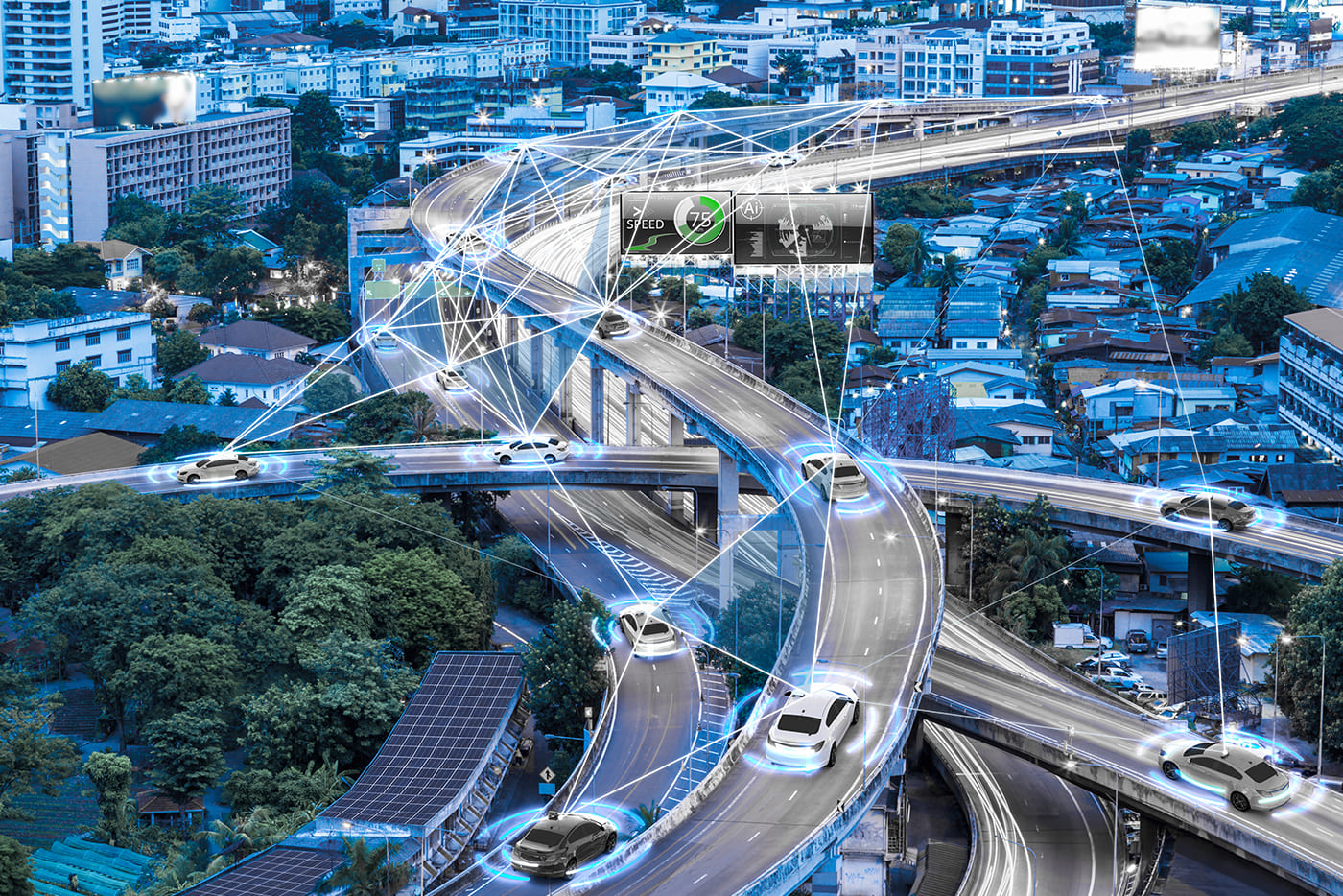The Future Trends In Mobility And Transportation
23 May 2022
The way we travel from place to place is changing at a faster pace than any time since the proliferation of automobiles, trains, and airplanes during the last century. There are two main drivers – the need to adapt to changes in human behaviors and the need for greater sustainability.

These factors are behind the ongoing shifts towards electrification, automation, connectivity, and as-a-service – today’s major technology trends in mobility and transport. Whether we are commuting into cities for work, traveling to foreign destinations on holiday, or simply meeting with friends and family to socialize, we have more options than ever before. However, we also have greater responsibility to do so in a way that minimizes the impact on the environment.
Underpinning all of these advances is artificial intelligence – our ability to create machines that can learn for themselves and make decisions that previously could only be made by humans. This is the technology behind autonomous cars, taxis, ships, and even aircraft that are quickly becoming a part of everyday reality. It also drives the development and usage of new types of energy and propulsion, such as electric vehicles, and enables services like Uber that have revolutionized ride sharing.
Flying Taxis
Depending on your age, the concept of flying taxi cabs might bring to mind either The Jetsons or Futurama – two science-fiction-themed cartoon shows that created entertainment out of our seemingly outlandish ideas about the future. Today, however, it’s serious business – with companies including Uber, Boeing, and Hyundai – as well as a host of startups – working on bringing vehicles to market. The first trial flights of an autonomous air taxi service were carried out in 2017 in New Zealand by Wisk, backed by Boeing and the Kitty Hawk Corporation. That same year, Sheik Hamdan Bun Mohammed was autonomously transported 200 meters by Volocopter, a prototype autonomous air taxi partly funded by Daimler. This year, Brian Morrison, co-founder of Alaka’i and inventor of Skai, the world’s first hydrogen-powered autonomous aircraft, told me that the technology is here, and the world is just waiting for governments and regulators to catch up before this seemingly futuristic mode of transport becomes an everyday reality.
Hyperloop
Not content with inventing online payments, revitalizing space travel, and purchasing entire social networks, the world's richest man has long been an advocate of bringing to reality a hypothetical method of mass public transport first proposed in the 18th century. Elon Musk took the concept of the Vactrain – a train propelled through a vacuum tunnel by air pressure – and developed it into a "hyperloop", with testing set to begin this year.
Rather than build the system himself, Musk published his work on the concept, and his company SpaceX hosts an annual competition for individuals and organizations that think they are capable of bringing it to life. Due to traveling through a vacuum, hyperloop trains are – theoretically – capable of traveling at speeds of up to 760 miles per hour, making it possible to travel overland from San Francisco to Los Angeles in a little over half an hour. The trains are suspended in tube-like tunnels via magnets to eliminate friction and potentially create zero emissions. A small-scale, 500-meter demonstration was carried out by Virgin Hyperloop in 2020, and this year a number of other projects are expected to launch this year.
Glydways
Another innovative concept that its inventor is pitching as potentially the next game-changer in mobility and transport, Glydways involves autonomous journeys in personal vehicles along a dedicated network of pathways. Unlike Hyperloop, however, these pathways – or roads – would be affordable enough to deploy that the system would allow for almost point-to-point journeys, rather than simply taking passengers to stations – as with a rail or air travel network – where they would have to take another form of transportation to reach the endpoint of their journey.
Glydways CEO Mark Seeger says that the system is designed to alleviate problems of traffic jams and congestion that plague cities today. It also aims to drastically reduce the cost of implementing public transport systems. This would have all sorts of positive societal implications, Seeger says, in a world where less than 200 of the 4,500 most densely populated cities have mass transit systems due to a lack of economic viability.
He says, "In the US, it costs over one billion dollars per mile of train track … the scientific term for that … is ‘bonkers crazy’ … you just can’t afford to build a lot of it.”
The 10 foot by three foot Glydways cars are each capable of carrying up to four passengers, and they travel totally autonomously along dedicated traffic lanes that can either sit alongside existing roads – taking up about the same amount of space as a cycle lane – or be elevated above them or tunneled below them.
Seeger says, "It turns out that if you take the model of a railway system … having your own exclusive road … but rather than having big, heavy trains, deploy a fleet of little vehicles … you can control every vehicle very carefully in a very orchestrated way … and you can actually move more people in less space with less energy and less cost.”
Mobility-as-a-Service
Two factors are driving the increasing adoption of the “as-a-service” model of delivery for transport – the growth of subscription models of payment for all types of goods and services and the increasing urbanization of human populations. Today, 55% of the world’s population lives in cities. There are many cities where private car ownership is less essential due to the availability of public transport or the viability of making more journeys on foot or by smaller vehicles such as bicycles and scooters. In these environments, ride-sharing and carpooling are becoming increasingly popular choices in situations where access to a car is necessary. Even for those outside of cities, paying for a vehicle by subscription is becoming an increasingly popular choice; car manufacturers including Volvo, Jaguar Land Rover, and Hyundai all offer subscription services where motorists pay one monthly fee to cover all charges associated with car ownership. Additionally, specialist car subscription providers such as Cazoo, Elmo, and Onto offer cars from a choice of manufacturers.
The mobility and transportation space is set to undergo a massive transformation over the coming years.
Related Articles
Dreamforce 2025: Why I’m Excited About Salesforce’s Agentic Enterprise Revolution
By now, “smart” versions exist of just about every home appliance, gadget and gizmos we can think of. However, manufacturers continue[...]
The Top 5 Technology Trends For 2026
By now, “smart” versions exist of just about every home appliance, gadget and gizmos we can think of. However, manufacturers continue[...]
Dreamforce 2025: Why I’m Excited About Salesforce’s Agentic Enterprise Revolution
By now, “smart” versions exist of just about every home appliance, gadget and gizmos we can think of. However, manufacturers continue[...]
Robots And AI Are Rewriting The Future Of Surgery
By now, “smart” versions exist of just about every home appliance, gadget and gizmos we can think of. However, manufacturers continue[...]
Space, AI, And The Future Of Human Potential
By now, “smart” versions exist of just about every home appliance, gadget and gizmos we can think of. However, manufacturers continue[...]
Invisible Intelligence: Nokia’s Networks With A Sixth Sense
By now, “smart” versions exist of just about every home appliance, gadget and gizmos we can think of. However, manufacturers continue[...]
Sign up to Stay in Touch!
Bernard Marr is a world-renowned futurist, influencer and thought leader in the fields of business and technology, with a passion for using technology for the good of humanity.
He is a best-selling author of over 20 books, writes a regular column for Forbes and advises and coaches many of the world’s best-known organisations.
He has a combined following of 4 million people across his social media channels and newsletters and was ranked by LinkedIn as one of the top 5 business influencers in the world.
Bernard’s latest book is ‘Generative AI in Practice’.










Social Media